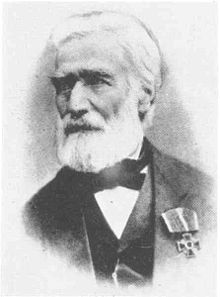Elias Grünebaum
Elias Grünebaum (born September 10, 1807 in Reipoltskirchen ; died September 25, 1893 in Landau in the Palatinate ) was a German rabbi and historian .
Career
He was the son of the merchant Benjamin Abraham Grünebaum and Hanna Eli. He was raised in Münchweiler by his stepfather, Isac Felsenthal. After training as a Talmudist in Mainz (from 1823 to 1826 with Löb Ellinger), Mannheim (from 1826 to 1827 with Simon Wolf) and from 1827 at the yeschiwa in Frankfurt am Main and an external Abitur in Speyer , Grünebaum studied at the Rheinische Friedrich from 1831 -Wilhelms-Universität Bonn and Ludwig-Maximilians-Universität München (from 1832 to 1834) the subjects of oriental studies and philosophy , which he completed with a doctorate . In Bonn he belonged to the circle of friends around Abraham Geiger and Samson Raphael Hirsch .
In 1834 he passed the rabbinate exam in Bayreuth and then worked in the state rabbinate of the Principality of Birkenfeld . In 1836 he was appointed head of the district rabbinate in Landau in the Palatinate.
In 1835 he became a member of the Association of Jewish Scholars .
In 1886 he received the Order of Merit of St. Michael .
Act
Grünebaum campaigned for the Jewish community in Landau and also played a key role in the emancipation of the Jewish citizenship. He arranged for a new synagogue to be built in Landau . He also pushed through the establishment of a Jewish cemetery . Grünebaum organized a Jewish school system, but he was particularly interested in religious instruction in community schools for Jewish and Christian students.
Together with the historian Christian Friedrich Maurer , the first director of the Höhere Töchterschule in Landau, which later became the Max Slevogt Gymnasium , Grünebaum developed a concept for Jewish religious instruction in 1873 and became the school's first Jewish religious teacher.
Elias Grünebaum is the author of Jewish theological books and articles that were widely recognized in German Jewry during his time. He also wrote several writings on the history of Judaism, including those in the region of his work.
Works (selection)
- Divine lectures. Ten sermons. A. Bielefeld, Karlsruhe 1844 ( digitized from Freimann Collection, Frankfurt / Main University Library ).
- The moral doctrine of Judaism in relation to other creeds. In addition to the historical evidence of the origin and importance of Pharisaism and its relationship to the founder of the Christian religion. ( at Google Books ), Schneide 2nd very increased edition, Strasbourg 1878 (new edition: Cologne 2009, ISBN 978-3-412-20316-0 .)
- Israelite community, synagogue and school in the Bavarian Palatinate. A historical illumination of their legal conditions since the beginning of this century. Kaußler, Landau 1862 ( digitized version ).
literature
- Victor Carl: Lexicon of the Palatinate Personalities. 2. revised u. extended edition, Hennig, Edenkoben 1998, ISBN 3-980-46682-5 , p. 236.
- Rainer Dick: Elias Grünebaum, the rabbi from Reipoltskirchen. In: Westricher Heimatblätter, 20 (1989), pp. 52-53.
- Entry GRÜNEBAUM, Elias. In: Michael Brocke and Julius Carlebach (editors), edited by Carsten Wilke : Biographisches Handbuch der Rabbis. Part 1: The rabbis of the emancipation period in the German, Bohemian and Greater Poland countries 1781-1871. K G Saur, Munich 2004, ISBN 3-598-24871-7 , p. 386 ff.
- Adolf Brüll : Grünebaum, Elias . In: Allgemeine Deutsche Biographie (ADB). Volume 49, Duncker & Humblot, Leipzig 1904, p. 596 f.
Web links
- Literature by and about Elias Grünebaum in the catalog of the German National Library
Individual evidence
- ↑ Christen-und-juden.de - Elias Grünebaum , accessed on May 23, 2010
- ↑ Elias Grünebaum: On the history of the Jews in the Palatinate. In: Popular scientific monthly sheets for instruction on Judaism for educated people of all confessions. 2.1882 No. 5.6, pp. 97-104, 121-127.
| personal data | |
|---|---|
| SURNAME | Grünebaum, Elias |
| BRIEF DESCRIPTION | German rabbi and historian |
| DATE OF BIRTH | September 10, 1807 |
| PLACE OF BIRTH | Reipoltskirchen |
| DATE OF DEATH | September 25, 1893 |
| Place of death | Landau in the Palatinate |
